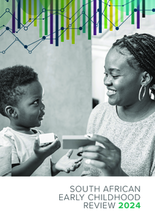According to the South African Early Childhood Review 2024, young children in South Africa are more likely to live in poverty, suffer from food insecurity and malnutrition, and die before their fifth birthday than they were before the COVID-19 pandemic.
ECD is central in reducing socioeconomic inequality. This fact is broadly accepted in South Africa, yet most children are born into environments that reduce their chances to realise their potential – typified by insufficient access to high-quality health services and nutrition, inadequate living environments, lack of security and social protection, and limited opportunities for quality early learning and stimulation.
From the very start, they are chronically underpowered to participate fully in the economy and society. They are unable to fully realise the benefits of formal schooling, with obvious repercussions during adolescence and later in life. Despite the many achievements of the post-apartheid period, progress across the various domains of ECD is unacceptably slow.
Leadership on ECD by the Department of Basic Education, the National Planning Commission and social partners is already showing many green shoots. The new Government of National Unity presents an unmissable opportunity to improve coordination among the national and provincial departments responsible for ECD and accelerate the expansion of essential and quality ECD services.
The South African Early Childhood Review 2024 tracks data on the status of children under six years. It is jointly published by Ilifa Labantwana; the Children’s Institute at the University of Cape Town; the Department of Planning, Monitoring and Evaluation in the Presidency; the Department of Basic Education; the Grow Great Campaign; and DataDrive2030.

